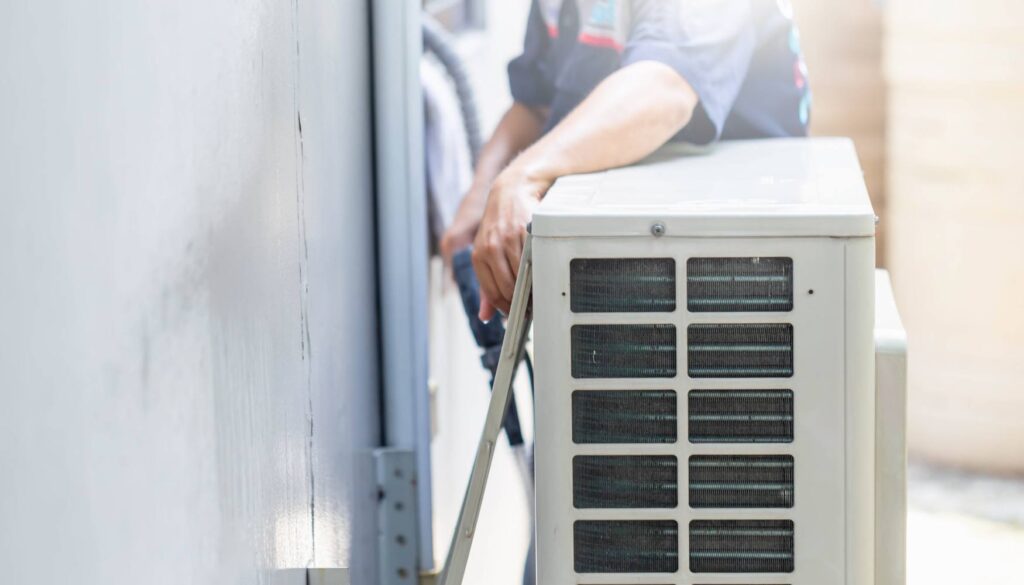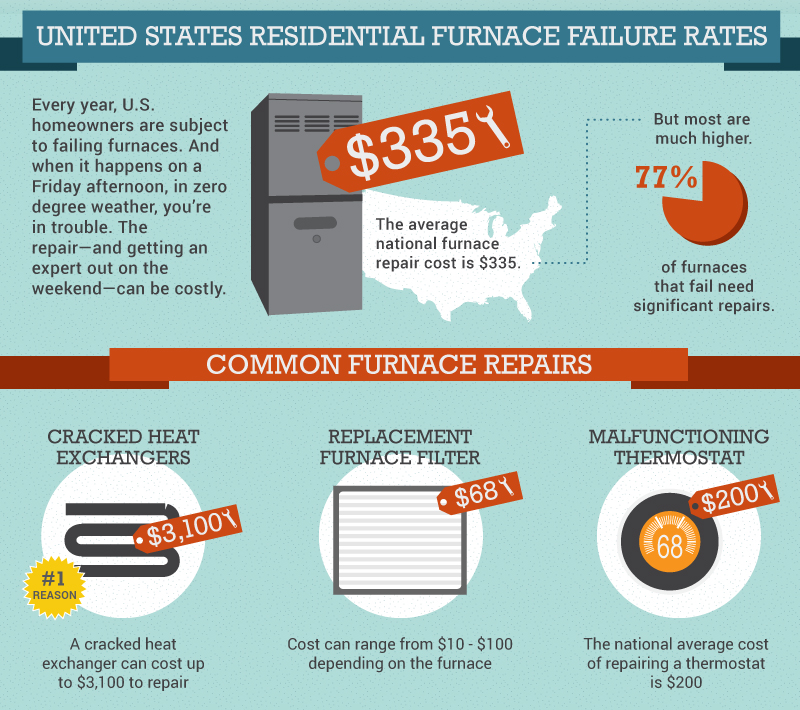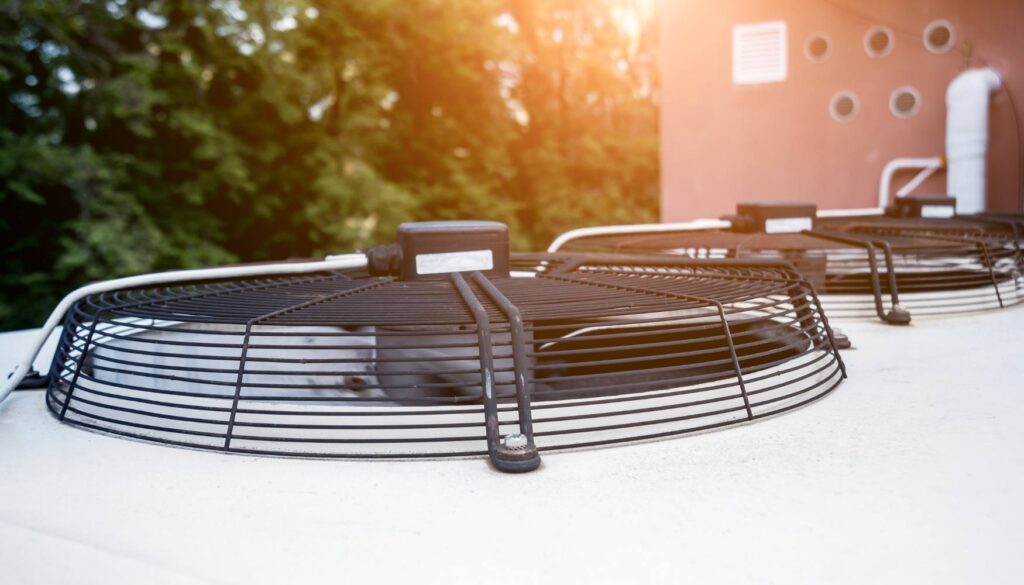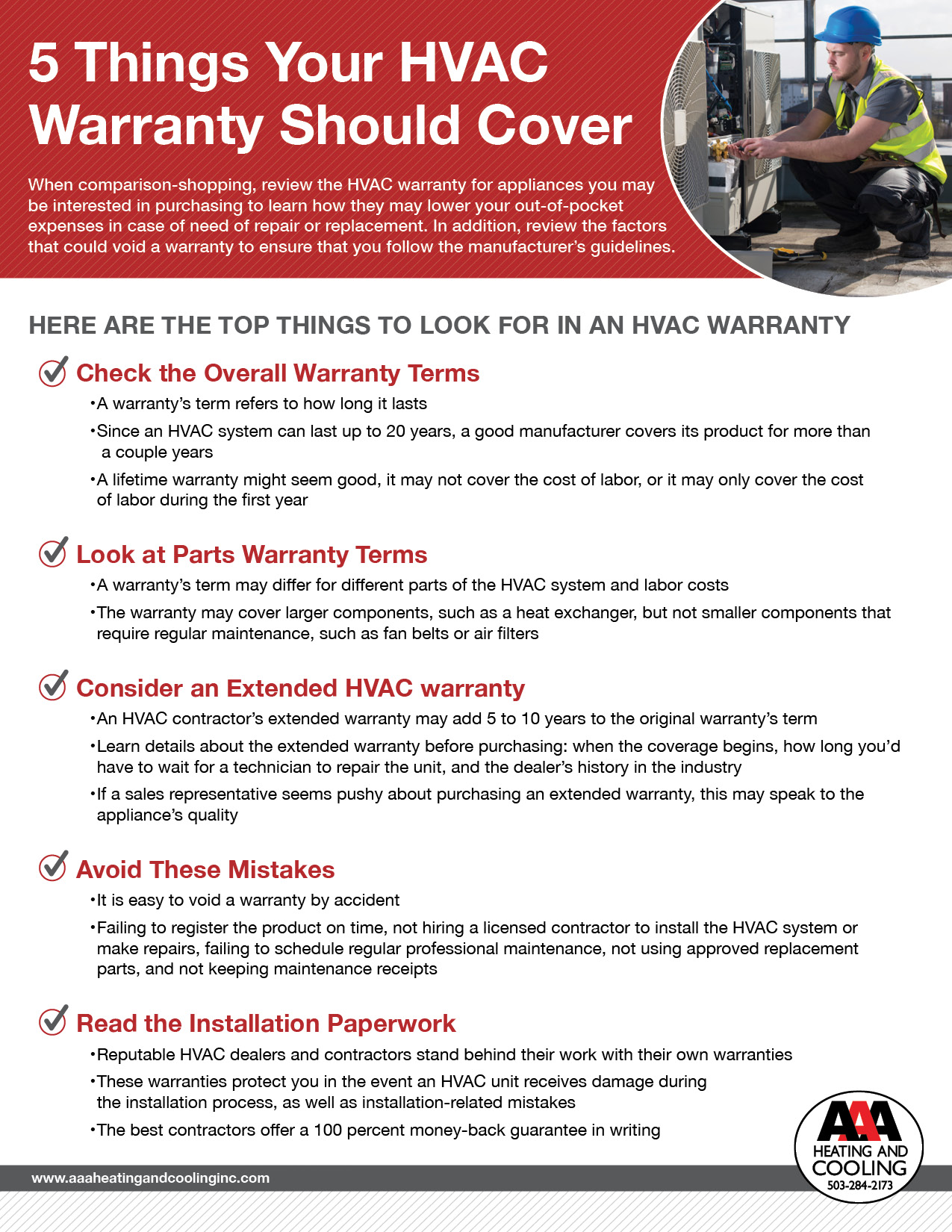HVAC Warranty: Does Your Home Warranty Cover HVAC?
The time has come — your house needs a new heating and cooling system. With such a large investment, you want to be sure you’re paying attention to the HVAC warranty just as much as you are to the cost of the systems and their different features.
You know nothing lasts forever, and that includes your HVAC.
If something goes wrong within a few weeks, months, or even years after installation, what does a typical HVAC warranty cover to help lower your out-of-pocket expenses and minimize your frustrations during your heating and cooling crisis?
Learn if home warranties cover HVAC systems, what to look for in an HVAC warranty, and what might void your HVAC warranty.
Table of Contents
- Does a Home Warranty Cover Your HVAC?
- Should You Purchase a Separate HVAC Warranty?
- 5 Things To Look For in an HVAC Warranty
- What Voids an HVAC Warranty?
- AAA Heating & Cooling: Offering HVAC Services in the Portland Metro Area
Does a Home Warranty Cover Your HVAC?
In many instances, a home warranty does cover your HVAC system, but not always.
Many home warranties cover the replacement of an air conditioner unit, but completely replacing your HVAC isn’t often the first step when something goes wrong. All machines and systems will eventually degrade in performance over time, but each component of a commercial HVAC unit has its unique level of longevity.
How long should you expect an HVAC unit to last?
- Air conditioner – 15 to 20 years
- Furnace – 20 years
- Heat pump – 15 years
Instead of a total replacement, companies look to repair what’s broken first. Are repairs usually covered under a typical HVAC warranty? Maybe. Sometimes. It depends.
Regarding HVAC, What Might Not Be Covered Under a Home Warranty?
A home warranty is not completely inclusive — it depends on the type of home warranty plan you have. In most cases, what might not be covered for your HVAC under your home warranty?
- Unit breakdowns due to poor HVAC maintenance. Check with your installer about their maintenance plans.
- Issues outside of normal wear and tear, like circuit overload or power failure.
- Issues caused by weather changes like damage from floods, storms, winds, rainfall, etc.
- Changes in your HVAC equipment, like structural or electrical modifications should a new unit have different size of power requirements.
AAA Heating & Cooling has experience and expertise in navigating HVAC warranties. Our team of reputable NATE-certified technicians can help walk you through your options, recommend HVAC systems, and handle your installation. Contact us today.
Should You Purchase a Separate HVAC Warranty?
Although a separate HVAC warranty isn’t always necessary, it can be a good idea to help cover all of your bases.
Many manufacturers offer warranties associated with their systems, so if you choose to purchase a separate HVAC warranty, there are some things you should consider.
5 Things To Look For in an HVAC Warranty
#1: Check the Overall Warranty Terms
A warranty’s terms refer to how long it lasts. Remember, an HVAC can last up to 20 years, so a good manufacturer will offer an HVAC warranty that covers their product for more than a couple of years.
HVAC systems can be costly, so look closely for warranties that have the longest terms.
Additionally, beware of lifetime warranties. While they seem intriguing, they might not cover the cost of labor at all or outside of the first year.
#2: Look at the Parts Warranty Terms
The terms of a warranty might differ for different parts of the HVAC system and labor costs.
For example, the warranty may cover larger components, like a heat exchanger, but not smaller components that require regular maintenance, like a fan belt or air filter.
Even if these parts are included, they often have varying time frames depending on the lifetime of the unit.
As you work with a contractor, learn if the contracting company or manufacturer has a warranty-processing fee to help handle the warranty-related paperwork even when replacement parts are covered.
#3: Consider an Extended HVAC Warranty
An extended warranty does just that — it extends the terms of the warranty often by 5 to 10 years for parts and labor coverage.
However, we don’t always suggest you jump at the opportunity to purchase an extended warranty. Sometimes, a salesman being pushy about an extended warranty might be a reflection of the quality of their product.
Extended warranties often have specific details related to them. Make sure you learn about them, like:
- When the warranty service is available
- How long you’ll have to wait for a technician to fix the HVAC system
- The amount of time the contractor has been in business
#4: Avoid These Mistakes
There are many ways to accidentally void your warranty, and you might not know you’ve done it until the time comes to use it. Make sure you learn about all of the possible ways you might accidentally void your warranty.
#5: Read the Installation Paperwork
In addition to a manufacturer standing behind its products, an HVAC contractor should stand behind the services it offers. A reputable manufacturer should provide you with a manufacturer’s warranty, and the contractor should also offer their own warranty.
These warranties protect you should an HVAC unit receive damage during the installation process or if there are installation-related mistakes.
The best contractors typically offer a 100% money-back guarantee in writing for these errors because they trust the work of their team.
What Voids an HVAC Warranty?
Voiding an HVAC warranty is easy to do. If you don’t carefully read the fine print on what might void your warranty, or you forget to refer back to your warranty when an issue arises, it can quickly become void.
To avoid accidentally doing this, learn what voids an HVAC warranty most often:
- Not registering the HVAC system and warranty with the manufacturer in the required amount of time.
- Not using approved replacement parts.
- Failing to schedule annual professional maintenance.
- Not hiring a licensed contractor, like AAA Heating & Cooling, to do the installation, maintenance, or repairs.
- Not keeping maintenance receipts.
AAA Heating & Cooling: Offering HVAC Services in the Portland Metro Area
An HVAC warranty should give you peace of mind and assurance that a manufacturer has your back if something goes wrong with your system.
Before purchasing an HVAC warranty, take the time to comb through the fine print and learn the details of your warranty. Ask questions if you have them or if something doesn’t make sense — a reputable HVAC contractor will insist that you do.
AAA Heating & Cooling offers both residential and commercial services in the Portland Metro Area. Not only can we help you find the best deal and warranty for your project, but we can help with installation, maintenance, and repairs.
Contact us today to learn more about our HVAC services.
What Should I Look For In An HVAC Warranty? [Checklist]
HVAC warranties are incredibly important when you are considering purchasing a new system. Often, these warranties will decrease your future out-of-pocket expenses if the system ever needs repair or replacement. We’ve compiled the most important factors to consider in a warranty. Don’t miss these key areas when purchasing a new HVAC system to ensure that you get the most out of your warranty. Take a look at our checklist below to learn more.
Questions to Ask When Choosing Energy Efficient HVAC Systems
Shopping for an energy efficient HVAC system is a large investment in your home. As building envelopes become tighter and insulation improves the HVAC system that your home required 20 years ago might not fulfill the same needs today. This is especially true if your house received several energy-saving improvements. Asking the right questions about the products you are considering gives you the information that you need to make an educated decision about the best HVAC system for your home, needs, and budget
What to Ask When Shopping for an Energy Efficient HVAC System
What is the SEER number and HSPF rating?
The Seasonal Energy Efficient Ratio (SEER) on a cooling unit tells you how efficient it is. The Heating Season Performance Factor (HFSP) tells you about the efficiency of a heat pump. Systems with an ENERGY STAR label have a SEER of at least 14.5 and an HSPF of at least 8.2 (the higher the number, the greater the efficiency).
What HVAC size do I need?
An energy efficient HVAC will actually waste energy if it is too big or too small. Instead of just using the size of an existing system, a contractor should also take into account additions and energy-saving upgrades that you’ve invested in your home. System size also matters if you plan to add multiple heating and cooling zones in your home.
What is the best type of HVAC unit for my home?
Heating and cooling units are available as natural gas-powered systems, all-electric units, heat pumps, combination systems, ductless mini splits, and radiant heat systems. Review your comfort standards and heating and cooling needs with a licensed HVAC contractor to learn about the advantages and disadvantages regarding the different types of HVAC units available for your home. Find out more about the energy and cost advantages of ductless systems here.
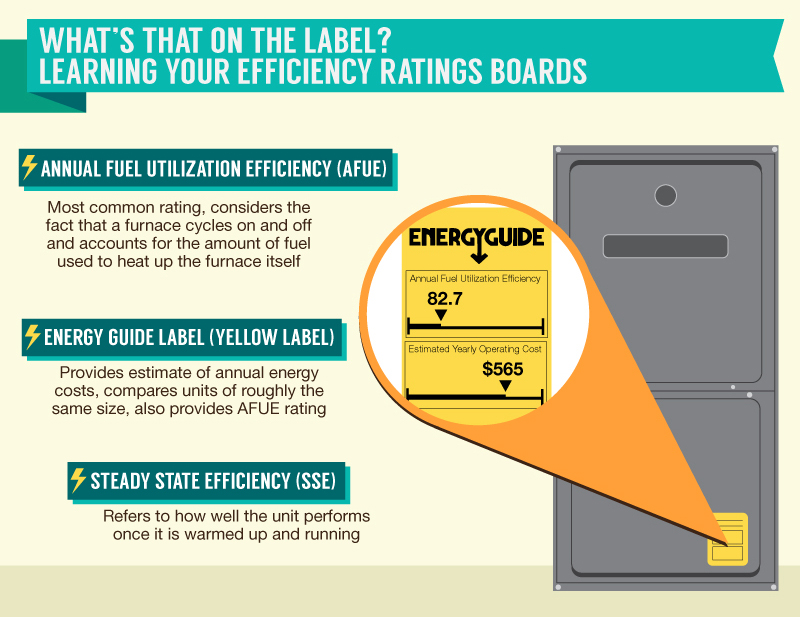
Can you provide me with a free, no-obligation quote?
A good HVAC contractor provides an accurate estimate for an HVAC system, its installation, labor costs, and the options available in writing. This estimate should include the price of parts, energy efficiency-related information and warranty specifications.
What rebates and tax breaks are available for energy-saving HVAC systems?
Investigate local, state, and federal tax laws and energy departments to learn if a system is available for a rebate or tax incentive. In addition, see which manufacturers are offering their own rebates to maximize your savings. A good HVAC contractor will have this information for you.
What are the lifetime operating costs?
When shopping for an HVAC system, look beyond the price and installation costs. Estimate the annual energy costs for your area. Learn how much it costs to maintain the system and if it needs specialized parts that might cost more than others.
What type of air filters does the HVAC unit use?
Some types of HVAC units use specific filters, while others may accommodate different types, such as disposable, washable, or HEPA filters. Learn how often you need to replace or clean the filters, too.
Do I need to replace all of the HVAC equipment?
For an HVAC system to work optimally, it must match the ductwork. Otherwise, you’ll experience energy losses. This could mean finding a heating and cooling system that matches the equipment in your home or replacing the equipment so it matches the system you choose. You may also need a new thermostat.
What does the warranty cover and how long does the coverage last?
Not all warranties are the same. Some offer longer terms and cover different aspects of the HVAC unit. When investigating warranties, also remember to educate yourself on what actions will void them. Curious about ratings? This is what those SEER ratings actually mean.
Does the HVAC unit have moisture control elements?
A home that’s too dry might make you feel uncomfortable, prolong the life of certain viruses, and can cause wood floors and furniture to crack from the lack of moisture. Too much humidity leads to mold and bacterial growth and can make a space feel too stuffy. Moisture control elements in an HVAC unit keep you comfortable and healthy while preventing unnecessary damage to your belongings.
Shopping for an energy efficient HVAC does not have to be confusing or overwhelming. When you work with a reputable contractor like AAA you’ll receive personalized assistance for finding the best energy-efficient products for your home and needs. Contact AAA today to schedule a free consultation. Learn more about our residential services here.
Photo by p.Gordon via CC License
